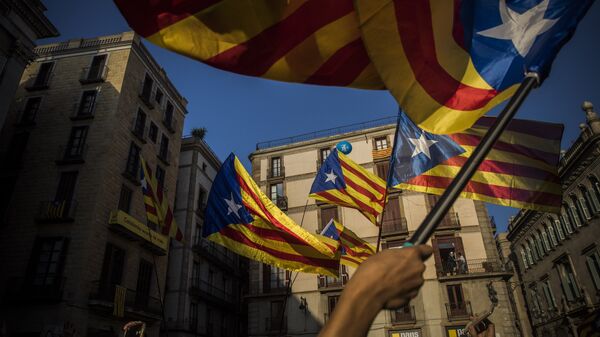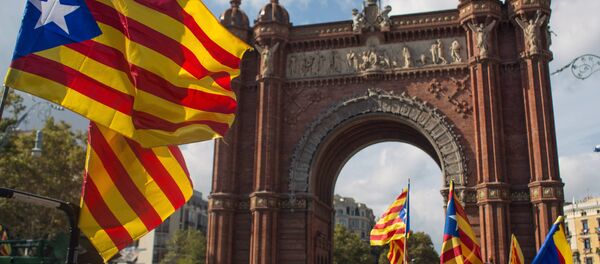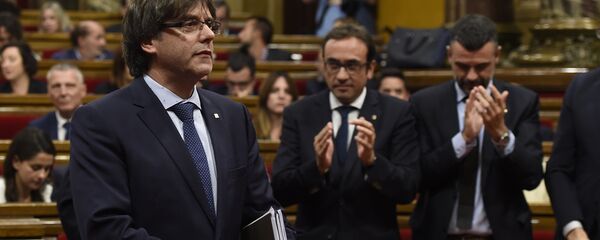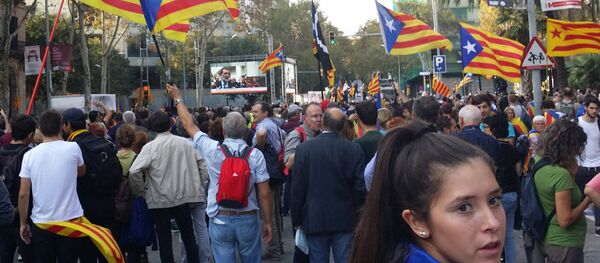On Thursday, the Catalans cast their ballots in the snap election, which followed dissolution of the local government, the Generalitat, by Madrid after it had adopted a resolution on the region’s independence from Spain in late October.
According to the preliminary results revealed on Friday, the ruling Popular Party (PP) won three seats. Three pro-independence parties — Together for Catalonia (JuntsxCat), Republican Left of Catalonia (ERC) and Popular Unity Candidacy (CUP) – secured 70 seats in the 135-seat regional legislature, two seats above the 68 required to have an absolute majority. However, the unionist Citizens (Ciudadanos, C’s) party is set to be the largest party.
Separatist Parties to Form Coalition, Seek Talks With Spanish Governement
Josep-Maria Terricabras, a member of the European Parliament for the ERC, told Sputnik that the three secessionist parties were planning to form a coalition in the regional legislature.
"We have been three different forces during the campaign but with a purpose of uniting our results and forming just a united government, just a united body. So that we are going to repeat, so to speak, the same policies and actions that we did before. We are going to form a government," Terricabras said.
The politician noted, however, that the talks between ousted Catalan leader Carles Puigdemont and Prime Minister Mariano Rajoy were rather unlikely to bring results due to the latter’s unwillingness to listen.
"It would help to solve the disagreements but I do not think that Mr. Rajoy wishes to talk to him. He is stubborn … He doesn’t want to talk to us … We have some members of Esquerra Republicana, who are sitting in the Spanish parliament to talk to him probably, but to convince him I do not think so. He is not ready to be convinced. He is not, in that sense, a reasonable man," Terricabras said.
Oriol Amat, former independent member of Catalan Parliament, Professor of Financial Economics at Pompeu Fabra University told Sputnik that the success of the Catalan pro-independence parties might pave the way for talks with Madrid on the future of the region without preconditions.
He added that accepting the result of the vote was currently the only legitimate option for Madrid officials.
"The Spanish Prime Minister and the Spanish government will have to accept that they have had a big defeat, now they have only three members in the Catalan Parliament, I mean the Spanish Popular Party, they must accept the result of the democracy, they must accept that they need to sit at the table and find democratic solutions, political solutions for the political problems that we have now," he explained.
Unionists Still Uncertain About Forming Coalition
Javier Nart, a member of the European Parliament for Citizen’s party, told Sputnik that the party still has not made its mind whether it would go for a coalition with other parties in order to achieve the absolute majority.
"The numbers make it very complicated. I make mine the words of [Citizen’s spokeswoman Ines] Arrimadas, when she says that we don't throw in the towel, we're never going to do that. We'll see what happens, let's wait and see what the separatist parties – which are more harmed – will do," Nart said.
"In my opinion, one in four Catalans understands that Catalonia is the project driven by Cs. A few years ago this was unheard of. We want to build a common society, where it is understood that no one is the owner of it, as some people seems to believe. We need to have a deep and common sense, to work for one Catalonia for all," Nart said.
Civil Organizations Call For Coexistence, Harmony
Societat Civil Catalana, a civil organizations opposing pro-independence movement, issued a press release after the election, in which it urged the new government to ensure "coexistence and harmony" among the Catalan citizens of various political views.
"[Societat Civil Catalana] considers that now it is essential more than ever to continue implementing its plan of action with the clear objective of promoting coexistence and harmony among Catalans and creating bridges of dialogue within the law to overcome the social fracture suffered by Catalan society of the separatist drift, provided that the established legal framework is respected at all times," the press release read.
"The unilateral path hurts all Catalans and the pro-independence representatives must be aware that if they continue to act as they have done so far they can generate an internal crisis in Catalonia without precedent," the press release read.
The autonomous region has faced weeks of turmoil following the referendum on independence held on October 1. Over 90 percent of 2.2 million out of 5.3 million registered voters have backed independence. Madrid has not recognized the legality of the vote or its results. On October 27, the Catalan parliament passed a declaration of independence, but the Spanish Senate on the same day approved the use of article 155 of the Spanish constitution, which allows Madrid to impose direct rule over the autonomous region.




